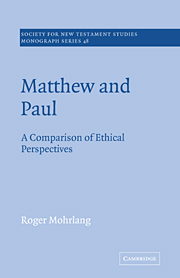Summary
Contemporary New Testament scholarship reflects the current trend in literary criticism to see works as ‘integrated wholes’, and the body of a writer's work as ‘a totality proceeding from a single mind’. Redaction-critical studies in particular have therefore focused attention as never before on the theological perspectives of the New Testament writers themselves, in an attempt to understand how these may have shaped their writings. As a result, there is a growing appreciation of the importance of understanding the individual writers’ thought, and a renewed interest in comparing their viewpoints.
The writings of Matthew and Paul are of special interest in this regard, because of the different positions they seem to take with respect to the Jewish law – a matter that would appear to have far-reaching implications not only for their own views of the Christian life (and those of the communities they represent), but also for Christian theology and ethics more generally. These two writers therefore provide a useful point of focus for the larger question of unity and diversity in the New Testament as a whole.
This particular study is an attempt to compare the two writers' views on ethics. Its concern is not so much with the specific content of their moral teachings (though that inevitably enters in), as with the overall structure of their ethical thought.
- Type
- Chapter
- Information
- Matthew and PaulA Comparison of Ethical Perspectives, pp. 1 - 6Publisher: Cambridge University PressPrint publication year: 1984



